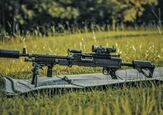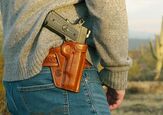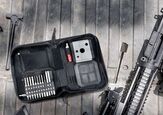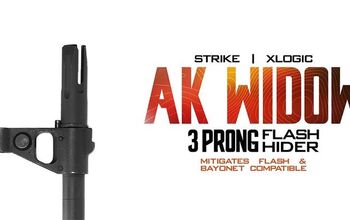Wheelgun Wednesday: The Bearcat Pilgrimage

Kentuckians are gunfighters by nature. So much so that since 1891, every public official in the commonwealth must swear an oath that they will not engage in duels: “Since the adoption of the present Constitution, I being a citizen of the state, have not fought a duel with deadly weapons within the State or nor out of it, nor have I sent or accepted a challenge to fight a duel with deadly weapons, nor have I acted as a second in carrying a challenge nor aided or assisted any person thus offending, so help me God.”
My father was a Kentuckian. His mother, whom I never met, hated boys. She’d try to put him in dresses, and if he had been born in the current era, I have no doubt she would have tried to trans him. He rebelled by embracing all things cowboy. He wore cowboy boots every day of his life. He donned a cowboy hat when he was on his tractor. We watched John Wayne movies just about every Saturday night and no weeknight meal was complete without beans and hoe cakes.
He owned many guns, but none so prized as his 1965 Ruger Bearcat, which he affectionately called his “cowboy gun,” despite it being just a little .22LR six-shooter. When he was a young man, he tried to take up leatherworking and made a holster for it. It doesn’t have a belt loop, but it does have a string on the bottom. I don’t know if he just didn’t figure out a belt loop or if he meant it as a pocket gun, or maybe even a boot gun. I’m not sure I’ll ever know.
The Bearcat functions much like a Colt Single Action Army. The cylinder doesn’t swing out. Instead, to load it, you half-cock the hammer so the cylinder rotates freely and then flip out the loading gate to expose the chambers. A pushrod manual ejector in the front ejects the spent casings.
Violent Delights, Violent Ends
This little Bearcat has a lot of history. My dad nearly executed his stepfather with it. His stepfather liked to drink and slap my dad’s mama around. One night, my dad had had enough. He held the Bearcat to his head, cocked the hammer, and pulled the trigger. The only thing that saved my dad from a murder charge was his mama leaping over and jamming the skin between her thumb and forefinger between the hammer and firing pin.
It was the gun he grabbed when he came home to find his first wife in bed with another man. He chased them into the woods with it, leading to the one night he spent in jail wearing nothing but his tighty whities. This was the early 1970s, and Kentucky law was much more understanding back in those days.
The stress of that marriage led to a severe heart attack in his mid-30s. It was so bad that the doctors told him he’d never walk again. He not only walked again, but remarried, had two more sons, and started a successful manufacturing business.
Every weekend he would watch John Wayne and dream of one day going West. But he never got the chance. Just like his own father, he fell over dead at 53 of a heart attack—his ill health, stress, and 20-cigar-a-day habit catching up with him.
A couple of years after my dad’s death, the Bearcat was the pistol that sat in my pocket as his former foreman explained to my widowed mama and me that he was taking the family business for himself, including all the customers and employees. To this day, that man probably doesn’t realize how close he came to getting his brains blown out in my dad’s office, but I guess what little sense I had at the time prevailed. I put the Bearcat away, eventually repented of my wild ways, and it sat in storage for many years.
Wagons West
Earlier this year, I was invited to the Doomer Optimist Campout at the Wagon Box in Story, Wyoming. Until Paul McNiel took it over a couple of years ago, the bar, restaurant, and campground served as a biker den, where they’d gather to harass the locals. Paul took the Wagon Box back to its Western roots, aiming to make it “cozy, based, and wholesome.”
The Wagon Box is one of my favorite places, but it’s a bear to get to. The closest airport is Sheridan, 30 minutes north, but there aren’t many flights going there. Next is Billings Montana, about two hours away, but flights there are only slightly less scarce. We hadn’t had a proper family vacation since before COVID, so we decided to make the trek in our van; 2,800 miles total from Tennessee, up to Paducah, Kentucky, across Illinois into Kansas City, up to Sioux Falls, through the Badlands and endless Wall Drug billboards, over to Rapid City, and finally to Wyoming. I would fulfill my dad’s dream of going West.
Before we left, I decided to pull the Bearcat out of the gun safe and clean it up. It wasn’t in too bad of shape, though the cylinder base pin seems to be permanently jammed in place. I fired a few test rounds and was satisfied that it still worked.
I agonized over whether to bring the Bearcat with me. What if it were stolen on the road or seized by police in gun-unfriendly Illinois? I finally decided that if I were going to lose it, taking it West would be the final story it’d tell.
Six Rounds in Wyoming and into Deadwood
The Doomer Optimist campout was busy. I spent most of my days in talks and my nights either in song or conversation with my friends. But I stole a few minutes one afternoon to tramp into the woods and take a few shots at a beer can (my dad never paid for a target in his 53 years). Just one shot from the little .22 sent the can flying into the woods, never to be seen again. I emptied the other five shots into a log I set up as a target and I walked into the sunset, satisfied that I had fulfilled the mission.
But there was one more story to add to the Bearcat. On our way home, we spent an evening in Deadwood, famous for being the final resting place of Old West legend Wild Bill Hickock. Wild Bill was only 39 when he died in Saloon No. 10, shot to death by Jack McCall after winning a round of poker with what has become known as the Dead Man’s Hand: two black aces and two black eights. You can still visit that bar in Deadwood today, now known as the Wild Bill Bar.
After returning from the Deadwood strip and exhausted from our travels, we enjoyed a low-key evening. The kids played in the pool while I slowly lost money at the poker table. The next morning, we ventured up to the cemetery on Mt. Moriah and trekked up the steep hill to the final resting place of Wild Bill and his companion Calamity Jane.
The graves were littered with shell casings, coins, poker chips, and tiny bottles of whiskey left as a tribute. I added a casino chip to the collection.
I then set my father’s Bearcat between the two and took a photo. I never knew exactly where my father wanted to go when he said he wanted to go West—the American West is a big place. He could have meant the mountains of Colorado or the Arizona desert. But I figured Mt. Moriah was as good a stop as any.
One day I’ll pass the Bearcat on to one of my sons, and Lord willing, they’ll take it on adventures of their own. The West sits in a special place inside the American imagination. More than just dry history, it’s a land of folktales, tall tales, and the imagination of the limitless. In that regard, this particular Bearcat is as Western as any gun could be.

Josh is the Editor in Chief of The Fire Arm Blog, as well as All Outdoor and Outdoor Hub.
More by Josh C























![[DEFEA 2025] Maktes Arms from Armenia Presents Modular Bullpup Rifle](https://cdn-fastly.thefirearmblog.com/media/2025/05/03/07191/defea-2025-maktes-arms-from-armenia-presents-modular-bullpup-rifle.jpg?size=350x220)
![[SHOT 2025] Staccato's New HD 2011 Pistols with Glock Mags](https://cdn-fastly.thefirearmblog.com/media/2025/01/26/17281/shot-2025-staccato-s-new-hd-2011-pistols-with-glock-mags.jpg?size=350x220)



![[SHOT 2025] Hatsan Updates Bulltac Pump-Actions, New Mag-Fed](https://cdn-fastly.thefirearmblog.com/media/2025/01/24/03151/shot-2025-hatsan-updates-bulltac-pump-actions-new-mag-fed.jpg?size=350x220)
Comments
Join the conversation
An incredible tale, especially if you're familiar with Bearcat history past and present. Can't hardly afford them nowadays. Thanks for sharing. Make sure a copy of this article is saved with the gun..an amazing backstory.
I got one just like that one, but a bit older. A bit small for my hands, but it’s my favorite .22 revolver.